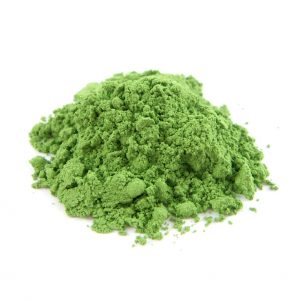Product Details
Place of Origin: Albania – Wildcraft
Botanical Name
Form
Herbal actions:
- Depurative – Substance that improves detoxification process and aids elimination to reduce accumulation of metabolic wastes products within the body.
- Anti tumor (traditional use) – Substance that has activity against malignant tumors
Health Benefits:
Red clover is considered to be one of the richest sources of isoflavones, which are water-soluble chemicals that act like estrogen (known collectively as phytoestrogens). Red Clover is therefore used for hot flashes/flushes, PMS, breast enhancement and breast health as well as lowering cholesterol, improving urine production and improving circulation of the blood, to help prevent osteoporosis, reduce the possibility of blood clots and arterial plaques and limiting the development of benign prostate hyperplasia.
Uses
Hot flashes/flushes, PMS, Lowers cholesterol, helps prevent osteoporosis, reduces possibility of forming blood clots and arterial plaques, can limit development of benign prostate hyperplasia. Breast enhancement and breast health. Improve urine production, circulation of the blood and secretion of bile. They also act as detergent, sedative and tonic. Red clover has the ability to loosen phlegm and calm bronchial spasms. The fluid extract of red clover is used as an antispasmodic and alterative.
Equine use.
Red Clover contains a volatile oil and has oestrogenic effects, helping to reduce the impact of falling oestrogen levels. Also can be used in treatment of skin conditions such as eczema.
Nutritional value
Red clover is also a source of many valuable nutrients including calcium , magnesium ,niacin, phosphorus ,thiamine,Chromium ,potassium and Vitamin C. Very high in cobalt and copper
Chromium There are primarily two common forms of chromium; One type of chromium is a toxic waste industrial by-product. The other form of chromium is a mineral nutrient that is essential to proper functioning of many systems in the human body. The body does not produce chromium, so it must be obtained through the diet. This mineral is only needed in trace amounts but can be found in a variety of food sources and supplement forms.
Potassium -This naturally occurring compound is important as a blood electrolyte, along with sodium and chloride. Potassium is a key mechanism removing Sodium (which has the chemical symbol “Na”) from cells in the body via a process known as the Na+/K+ ATPase pump. The body needs potassium in order to work this pump and remove sodium. Sodium is dangerous if it builds up in cells and this is why it is often advised to reduce sodium consumption and increase potassium, especially if one has high blood pressure and/or cardiac dysfunctions. Magnesium is also important in helping to maintain potassium in the cells.
Calcium –The most abundant mineral in the body, calcium is essential for a wide range of body parts and functions. Nearly 99% of the body’s calcium is involved in the maintenance of the bones and teeth; however, calcium also regulates the heart, nerves, muscles and other bodily systems.
Magnesium- An essential mineral that plays a role in hundreds of processes in the body, magnesium is an element human’s cannot afford to miss. Aside from zinc and calcium, magnesium is one of the most important nutrients and is vital in maintaining optimal health.
Vitamin C = As scientific studies actually back up Vitamin C as a way to dramatically improve the immune system and stave off major illness. There is, however, a far longer list of benefits that come from using Vitamin C .
Phosphorus – Phosphorus is found in every cell in the body and so plays a crucial role in nearly every bodily function. It helps the body use fats, protein and carbohydrates and is important in cell maintenance and repair. It supports muscle contractions, which include the necessary contractions of the heart muscle. The B-complex vitamins riboflavin and niacin can’t be digested without phosphorus. Phosphorus is crucial in reproduction as it is part of the nucleo proteins that regulate cell division and the passing down of traits from parents to children. Phosphorus also supports growth of the skeleton and teeth, as well as the health of nerves and kidneys.




Reviews
There are no reviews yet.